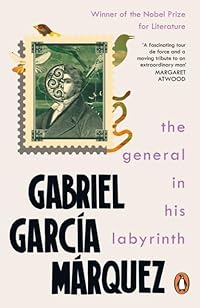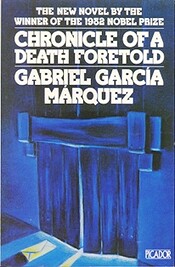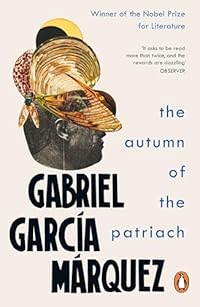Penguin, 2014, 290 p, including i p map of New Granada, iv p author’s thanks and xi p Chronology of Simón Bolívar. No translator given but it is most likely Edith Grossman as she was the translator for the Jonathan Cape edition from which the original Penguin paperback was derived. First published as El General en Su Laberinto, Mondadori Espana, 1989.

This, an account of the last days of Simón Bolívar, The Liberator, on his final trip down the Magdalena River from Santa Fe de Bogotá to the sea, is not typical Márquez. There is no hint of magic realism here and the book often reads more like a history than a novel. In that it is a portrait of a leader in decline it bears some similarities to The Autumn of the Patriarch but it would not do to stretch the parallel. In any case, unlike that novel, this one is not at all experimental in its writing. Márquez’s Bolivar (his name is only given once, and then in full, Simón José Antonio de la Santísima Trinidad Bolívar y Palacios) – known throughout as simply the General – is all too human, his wife’s untimely death, without which he may never have embarked on his adventures into history, locked away inside him, yet his liaisons with women legendary.
The novel starts in Santa Fe de Bogotá as the General, his hopes of uniting the lands of South America (certainly the former Spanish parts) into one country now lying in tatters, is awaiting Government permission to leave and go to Europe. At a gathering, “No one was certain, however, who was there for the sake of friendship, who in order to protect him, and who to be sure that in fact he was leaving.”
The details of the journey downriver are intercut with scenes from his life and military and governmental careers wherein Márquez has the opportunity to comment on the condition of being a military strong man, or any dictator. When official reports had led the General to believe the scourge of smallpox was being conquered, evidence to the contrary has him say, “‘It will always be like this as long as subordinates lie to make us happy.’”
The General is also biting about any criticism of the harsh measures he had taken in his campaigns, “‘Europeans would not have the moral authority to reproach me, for, if any history is drowned in blood, indignity, and injustice, it is the history of Europe,’” the difficulties of running a newly founded country, “‘I warned (General) Santander that whatever good we had done for the nation would be worthless if we took on debt because we would go on paying interest till the end of time. Now it’s clear: debt will destroy us in the end.’” In a letter he tells another General that, “Every civil war had been won by the side that was most savage.” Then to an aide, “‘Don’t go with your family to the United States. It’s omnipotent and terrible, and its tale of liberty will end in a plague of miseries for us all.’” Despite all his achievements he reflects ruefully, “‘It was not the perfidy of my enemies but the diligence of my friends that destroyed my glory.’”
An item I found curious is that Bolivar was initiated in Paris as a Mason “of the Scottish rite”. Odd how often Scotland pops up in these South American fictions.
The novel’s title is an allusion to the General’s last words which were, “‘How will I ever get out of this labyrinth!’” It is, of course, the same way as the rest of us.
This was obviously a subject to which Márquez felt he had to turn, taking up the idea from an unfinished work by his friend Álvaro Mutis. to chronicle the end of a life which may as well be a myth.
Pedant’s corner:- to not deprive (not to deprive,) Elbers’ (Elbers’s,) Andrés’ (Andrés’s,) Páez’ (Páez’s,) Palacios’ (Palacios’s,) duchess’ (duchess’s,) Valdehoyos’ (Valdehoyos’s,) Sáenz’ (Sáenz’s,) English and British are used almost interchangeably, Britain is nearly always referred to as England.

 In a prefatory note Márquez tells us this tale was inspired by his first journalistic assignment – to cover the emptying of the crypts of the old Clarissan convent dedicated to Santa Clara where from one of the tombs tumbled a mass of copper coloured hair, attached to the skull of whom the name on the tomb said was Sierva María de Todos Los Ánǵeles. This reminded Márquez of a story told by his grandmother of a young girl with hair that trailed behind her like a bridal train who had died after being bitten by a rabid dog many years before.
In a prefatory note Márquez tells us this tale was inspired by his first journalistic assignment – to cover the emptying of the crypts of the old Clarissan convent dedicated to Santa Clara where from one of the tombs tumbled a mass of copper coloured hair, attached to the skull of whom the name on the tomb said was Sierva María de Todos Los Ánǵeles. This reminded Márquez of a story told by his grandmother of a young girl with hair that trailed behind her like a bridal train who had died after being bitten by a rabid dog many years before.







